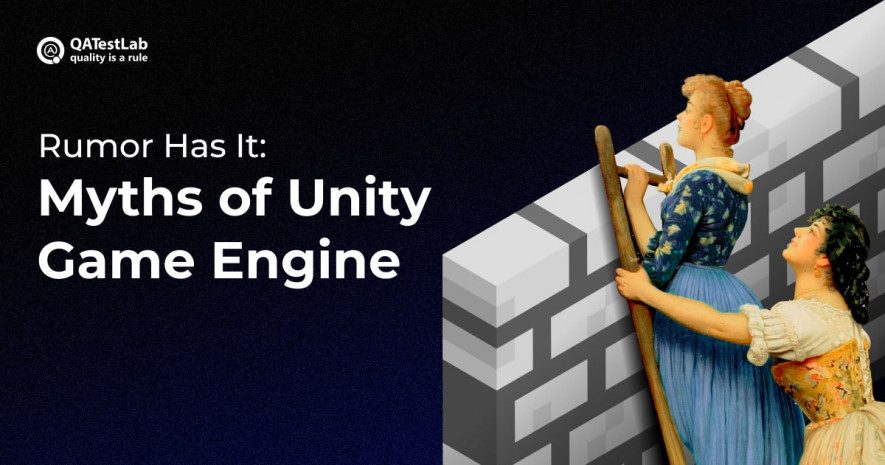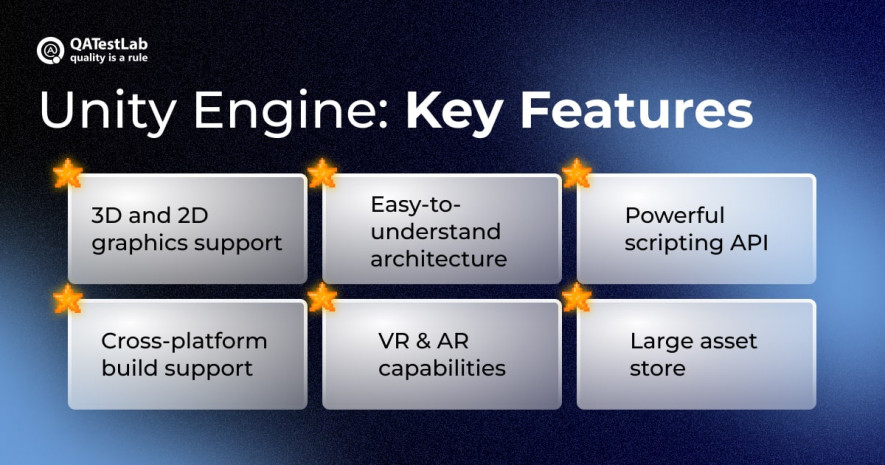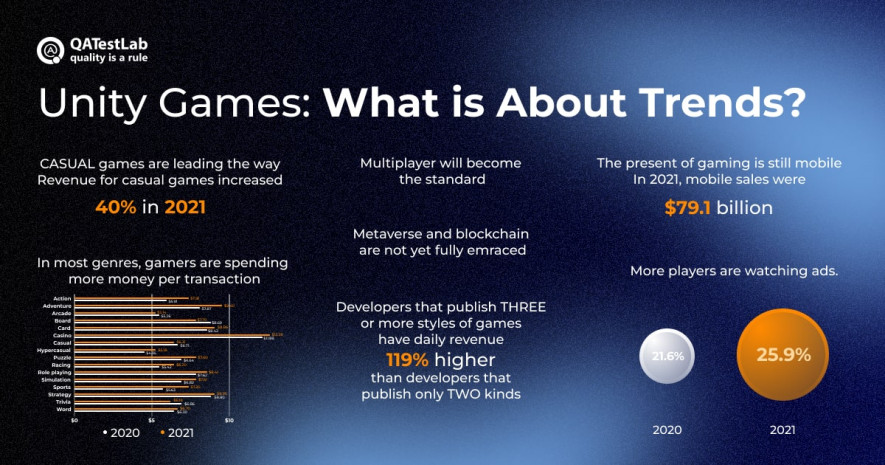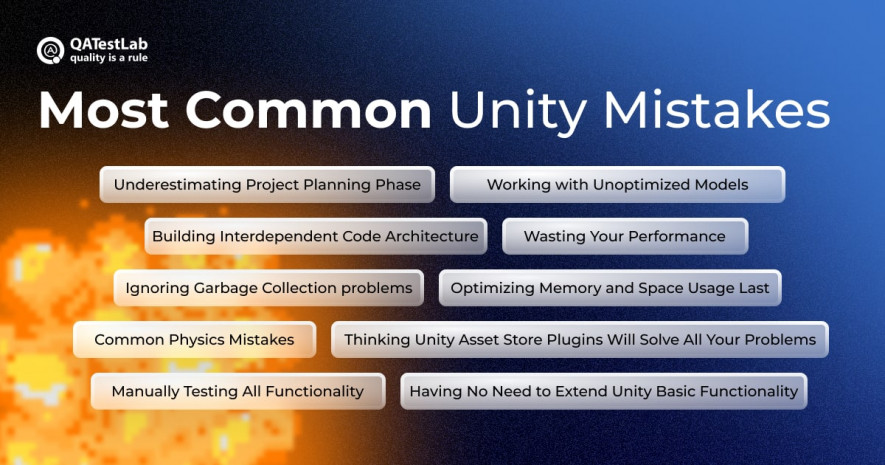- QATestLab Blog >
- QA for Business >
- Industries Insights >
- Rumor Has It: Myths of Unity Game Engine
Rumor Has It: Myths of Unity Game Engine

Have you ever come across a game developer forum where Unity isn’t discussed? Something unreal. But is everything that is written about this engine true? We surfed dozens of sites and read hundreds of posts to uncover the most popular misconceptions about Unity. And dispel them!
But let’s start from the beginning
There are dozens of different engines in the gaming industry. Some are designed for a specific game, others can be used to make games of a particular genre, and there are universal ones, like Unity, that open up more development opportunities. Unity has tools for creating objects, moving them, working with graphics, textures, and sound, so you can even make a full-fledged game with it alone.
A wide range of possibilities determines the popularity of the engine. Unity has published a 2022 report on its products and the gaming industry, in which it said that the number of titles released on the Unity engine last year grew by an impressive 93%, and the number of developers increased by 31%. Unity title revenue was up 29.9% in 2021, and daily player numbers remain at pre-pandemic levels.

And a little more about Unity’s success: mobile games built with this engine makeup 71% of the top 1000 games on the market. In fact, many popular games you probably don’t know were created with this engine. These include:
- Subnautica
- Cuphead
- Hollow Knight
- Fall Guys
- Valheim
- Genshin Impact
- Untitled Goose Game
… and much more. Sounds convincing, doesn’t it?

Wait a minute. What are the pitfalls then?
Since Unity allows people to create a game with minimal programming knowledge (and even for free!), some experts study the engine rather superficially. With this approach, there is no depth of understanding of Unity’s features and nuances. As a result, messages appear in chats of game developers that have no fundamental basis. Let’s deal with the main ones.
Myth 1: Unity is a tool for gamers
Of course, Unity was created as a game engine, but it is so flexible that it is successfully used in other industries. Basically, the only thing that limits what you can do in Unity is performance and your imagination.
Do you want to make RPGs, survival games, and platform games? Easily. Want to make a short animated film? Get started. Do you want to make the next VR hit to help schools provide kids with new learning ways? Unity can do it. No questions asked.
Myth 2: You can only make small games with Unity
Unity is very indie-friendly, but it does not limit the size of the game in any way. You can clone World of Warcraft or another huge open world map if you really want to. All scenes can be loaded and combined at runtime, so the player will not see loading screens while playing. It is also not true that Unity’s performance is degraded when there are too many objects in the scene. Of course, you have to optimize it specially. So it’s all about the experience.

Myth 3. Unity is worse than Unreal Engine
Let’s make a reservation right away: depending on what for. Unity has always been compared to Unreal Engine because the latter has always had the upper hand in the game development industry. Today the situation is a little different. While Unreal Engine was aimed at PC and desktop consoles, Unity took a chance with mobile devices. Unreal has always been about big games with stunning visuals, but this approach made it hard to learn and use. On the other hand, Unity is based on the Mono platform. Thanks to this, you can program your games in C# instead of C++, which is quite tricky to learn.
Myth 4: Game development in Unity does not require additional coroutines
The game requires a lot of work to complete each frame; there is all the basic stuff like rendering, physics, animation, etc. There’s also quite a lot of game logic — like reacting to player input to trigger actions. Developers want to keep latency to a minimum, so they do it as quickly as possible, which means keeping track of every frame. However, some pieces of logic don’t really need to be checked for every frame. Take the victory conditions: you want to check that the player is in a specific area, that they have killed certain enemies, that they have collected certain items, and so on. Will it really kill experience if there is a half-second delay between killing the last enemy and starting the win sequence? Often not. But devs still tend to check every frame because adding code to the update for every frame is more accessible than trying to schedule checks less frequently. Unity’s coroutine support is an excellent alternative to this.

Myth 5: Unity’s built-in tools check the game for errors
Often, developers restrict testing games to the Unity Test Framework (UTF). This is an automated testing system both in the Editor and on supported platforms. The Unity Package Manager’s built-in Test API extends the flexibility and power of UTF to provide maximum test coverage.
But is technology able to test all possible plot twists and gamer moves? After all, human decisions are often extraordinary and creative. Besides, is the evaluation system impartial? Is it possible to trust the verdict of a judge who is a part of the inner social circle of the person he has to prosecute?
The verdict of our QA experts is unequivocal: independent testing. This approach makes it possible to feel every detail, scene, and button of the game and see it through the eyes of the gamer. Automated testing of unit games can significantly reduce time, the human factors while maintaining the diversity of user behavior cases, and the cost of checking for bugs. And in the end — get a high-quality game.
Well, it looks like they figured it out
We hope you find these points helpful as you work on your Unity projects. Many things depend on the specific game, but keeping some basic rules in mind is always good.
By the way, our game testers have a special love for Unity games. If you want to share your brainchild and check the game for bugs with us, it will be a real success for our team. Always ready, always in the game.
Learn more from QATestLab
Related Posts:
- Balance adjustments in multiplayer games
- Updates Without Mistakes: Regression Testing in Game Development
- The Secret of NFT Games Popularity: Features and Benefits
About Article Author
view more articles






